Ten GOP primaries and caucuses were held on Tuesday, known as Super Tuesday for how many delegates are at stake, and Mitt Romney took home six state victories and and 212 of the 419 delegates. The Denver Post did cover Super Tuesday, but with minimal, unoriginial, and sometimes hidden coverage. Prior to Super Tuesday, the Post had an AP article on its website that tied in social issues and the Rush Limbaugh controversy into the night's primaries. As the Super Tuesday action picked up at night, the Post moved its constantly updating AP article and an accompanying carousal picture to the homepage. However, later in the night and the next day, readers had to work to find this article and the Post's standard photo photo slideshow, this time featuring 53 photos from Super Tuesday. Despite the quality of the slideshow, it was never featured on the homepage or even the homepage of the Post's Media Center, where viewers access the photo slideshows. When I have to click three seperate links and deal with three pop-up advertisements to read one AP article on Super Tuesday, I will not be impressed by that paper's coverage. I can only hope that the print version of the Denver Post has more prominent coverage of the GOP primaries. If not, the Post is doing a disservice to its readers.
Michigan and Arizona held their GOP primaries Tuesday, and Mitt Romney came away with two much-needed victories. The Denver Post had light coverage of the primaries heading into the night. Around 1 a.m. Tuesday, an article was published on the main page previewing the upcoming night. What was interesting about this article was it was written in past tense. For example, here is the lead: Republican presidential rivals Mitt Romney and Rick Santorum collided Tuesday in a rancorous Michigan primary that tested the clout of the GOP establishment against conservative and tea party rebels as well as the candidates themselves.Arizona Republicans voted in the second primary of the night, and Romney was favored by far in that race that drew scant attention. If I did not know any better, I would have said that this article was written after the primaries, but it was on their website the entire day. I felt like this was bad coverage by the Post, to have just one AP article on their website, written the way it was. Later in the night, the Post had two videos in its website, one less than a minute highlighting Romney's win in Michigan, and one under three minutes, focusing on the close race in Michigan. The Post also had a photo slideshow from the Michigan primaries, as I have come to expect from them. The coverage did not last long, as it was removed from the homepage the next day, and replaced with nothing about what Romney's wins mean for the GOP race or previewing Super Tuesday. Overall, I was disappointed with the Denver Post's coverage on an important night for the GOP primaries, especially in regards to the lone AP article on its website for much of primary night.
The GOP presidential candidates took part in another debate last night, and the Denver Post's coverage was very plain. Other than a photo slideshow, the Post had just one article covering the debate, and it was not very prominent on the homepage.
The homepage includes a politics tab, but the stories being shown on the homepage all had to deal with local political issues. In order to find coverage of the debate, a person would have to click the politics tab and and go the the Post's politics page to find any articles.
During the Colorado primary, the Denver Post did do an exceptional job of providing up to the minute coverage on what was going on that night, including live blogging, constantly updated articles, and, of course, photos.
The one area of the Denver Post's coverage that has continued to impress me is its photography. For every primary and debate, the Post has created a photo slideshow highlighting the night's events and the what the candidates were doing. These slideshows include many behind-the-scenes photos that provide an interesting and new look at the race for the GOP presidential nomination.
 Sharif Durhams, the Social Media Editor at the Milwaukee Journal Sentinel, visted our Seminar in Journalism class today and shared how the Journal Sentinel uses social media.
"Our job is to figure out how people are taking in info, and how to deliver it to them in that form," said Durhams.
Durhams shared a video with us of Herman Cain speaking to the Journal Sentinel's editorial board that received over one million Youtube hits after it was tweeted through the Journal Sentinel's Twitter account, @NewsHub. It would not have been as popular if it had merely been written about in the paper.
Social media also allows for transparency from reporters, Durhams said. Reporters can tweet or blog of post on Facebook updates on their progress and the reporting process. They can share how they found their story, and how they reached the conclusions they did in their story.
Our professor, James Scotton, asked Durhams how journalists can distinguish themselves in this shrinking field. Durhams gave two suggestions: to provide in-depth journalism and to be an entrepreneur. What can you do that is uniqe? Durhams said in-depth journalism is still very valuabe, and it is important that our class of young journalists keeps the value of journalism that we learn at Marquette. It is also important to figure out how you can use Facebook and Twitter, and whatever else comes along, to get your material out there.
Since September of last year, I have been required to write weekly blog posts for journalism classes at Marquette. But that word "required" can cause problems sometimes. Am I always putting the time and effort into my blog posts that I would be if I was writing them on my own accord? When I write them, do I make sure to write for a general audience and not simply my professor and classmates? In our journalism elections seminar course on Tuesday our teacher, Herbert Lowe, spent the last half hour of class sharing tips for how to ensure that we are motivated to write our blog posts not as an assignment, but as a way to prepare ourselves for our careers. I will admit that there have been times where I did not want to spend time writing my blog and wrote it hastily just to get it out of the way. But after our class on Tuesday, I felt motivated to dedicate myself to writing a quality blog post every week that not shared valuable information with the blog's readers but helped me learn as I researched for the blog. Judging by the blogs by my classmates, I am not alone. Mr. Lowe's pep talk of sorts seems to have served its purpose, as the whole class seems to be more motivated now to write their blogs. Hopefully this increased passion will stick with us and not merely fade away in a couple of days. Hopefully, my readers will notice my post providing better writing and more well-researched information too.
In our journalism elections seminar class on Tuesday, our professor asked if Mitt Romney was now the "presumptive candidate," i.e. that for all intents and purposes, he was the GOP candidate. When he asked that question, my first thought was that yes, he was the presumptive candidate. But then the Tuesday primaries and caucuses happended.
Rick Santorum had a clean sweep in Missouri, Minnesota and Colorado, home of the Denver Post. Coverage of the Colorado caucuses was front and center on the Denver Post wesbite for the entire day, providing up to the minute results, including a live blog by Post staff.
Besides the traditional articles stating that Santorum had won, the Post also included several photo slideshows, one of the GOP caucus and the other of the GOP candidates through the years. The Denver Post has continued to impress me with its photojournalism, as many of the top headlines are accompanied not just by written articles but also by photo slideshows.
These results definitely make the race for GOP presidential candidate more interesting. Money will start to roll in for Rick Santorum, and his prediction that he is now the main challenger to Mitt Romney is beginning to come true.
Mitt Romney won the Florida primaries convincingly Tuesday, adding 50 delegates to his total count. He still needs over 1,000 additional delegates to secure the GOP nomination for president.
The Post mostly used AP stories in its coverage of the primary results, although one of these AP stories was a photo slideshow that provided great behind-the-scenes looks at the primary. The Denver Post also covered the fact that Ron Paul and Rick Santorum had immediately moved out West to focus on the next several primaries in Nevada and Colorado. So the Denver Post's coverage of the primaries would expectedly pick up in the next week as it prepare's for its own state's primary.Romney moved back to focusing on the president during his victory speech, sounding confident once again that the nomination would be his. I was suprised by Rick Santorum's rather upbeat outlook on the results, saying that Gingrich's loss meant that the main competitor's spot to Romney was once again prime for the taking, and that he would be the candidate to do it.
In our elections class last week, we discussed how great news will be different, covering different aspects of events that other news outlets are not reporting. The Denver Post definitely did not do that with the Florida primaries, although this did not come as a suprise to me as the Florida primaries was probably not important enough to the people of Colorado for the paper to send its own reporters out to do in-depth coverage.
On Thursday, CNN hosted another Republican presidential debate between Mitt Romney, Newt Gingrich, Ron Paul, and Rick Santorum, and this time Wolf Blitzer was the moderator.
Several of the questions came from the audience or from participants who asked their questions via video, but Blitzer often added his own spin to the question before having the participants answer them.
Blitzer asked several questions that were aimed specifically to the state of Florida, including the future of NASA and space programs (which is a big part of Florida's economy) and about what to do with the housing crisis (which has hit Florida very hard).
Blitzer also was booed by the audience and scolded by the candidates multiple times for his questions. Santorum chewed into Blitzer for asking about Gingrich's and Romney's personal finances in relation to Fannie Mae and Freddie Mac, insisting that this was not an important issue that they should be focusing on. Blitzer was also booed by the audience for continuing to ask questions about the candidate's personal finances.
Another thing I noticed during the debate was how Blitzer did not constantly interrupt the candidates to tell them their time was up or to get back to the question at hand, he allowed them to talk. He also allowed for back and forth between the candidates, which created a lot of sparks and arguments between the candidates, most notably Gingrich and Romney (although that is nothing new).
President Barack Obama delivered what may be his final State of the Union Address Tuesday night, and the Denver Post was on top it all.
The Denver Post had the State of the Union preview on its home page the whole day leading up to the address, and then had live updating coverage of the address throughout the speech and featured on the homepage for as long as two days after the address.
In addition to its articles covering the address, the Denver Post also posted a State of the Union photo slideshow on its homepage. This slideshow was very impressive, as it had photos of workers preparing for the address behind the scenes, in addition to shots showing the high security for the night.
I live-tweeted the State of the Union (#SOTU), which you can check out from my Twitter account (@Benjsheehan3). As a political junkie, I would have watched the address regardless of any assignment I had with it, but reading some of the Denver Post's articles on it provided me with more knowledge about local reactions to the address.
One of the first things I noticed about the Denver Post was the different things it covers compared to the local newspapers of Chicago and Milwaukee that I traditionally read. The Winter X Games (which typically have but a small article buried in the sports section in the Chicago Tribune) were worthy of the DenverPost.com homepage, as they are held in Colorado.
An article about the lack of snow and its effects on the skiing season also was featured on the homepage, something that is ordinary I'm sure for people in Denver, but something I just am not used to seeing covered prominently.
And of course, Tim Tebow was featured on the homepage. If I had been covering the Denver Post last semester, I can only imagine how much Tim Tebow I would have been reading about. Did you know there is a brewery in Colorado that has started a "Tebrew," which a picture of a him Tebowing on the the beer label?
However, the Post does not only focus on local issues. I was rather impressed with its sections dealing with national and international news, including its political coverage. Politics will be a very important and hot-button issue in the coming months, and I am confident that the Post has the tools necessary to fully cover this news.
|
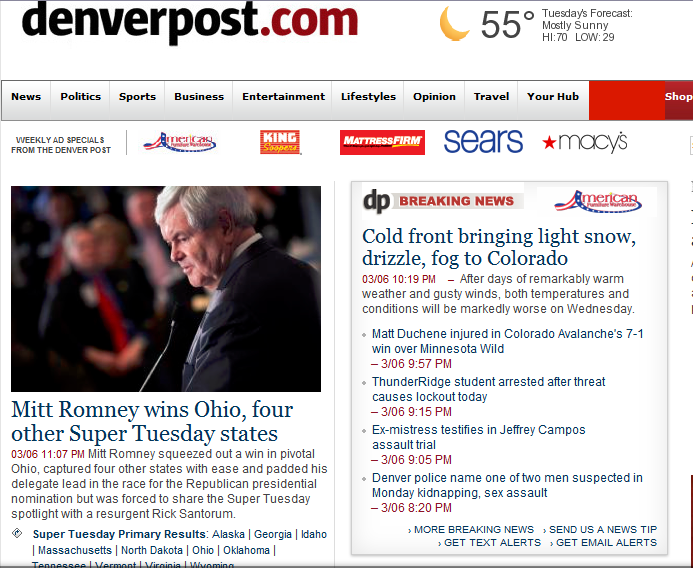
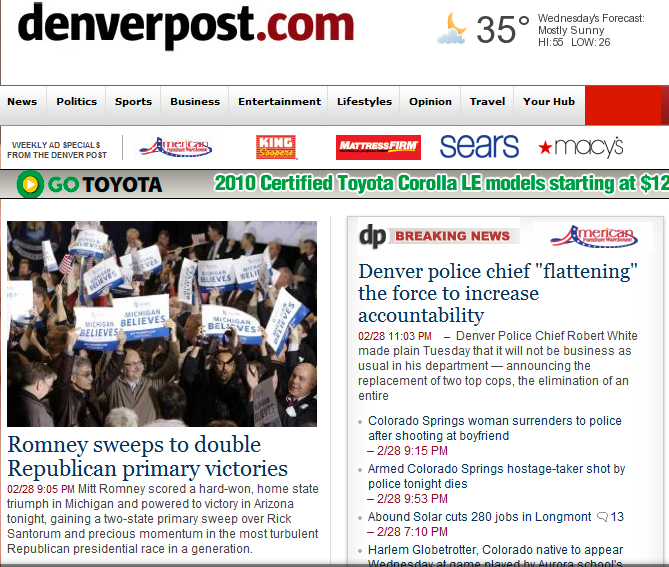


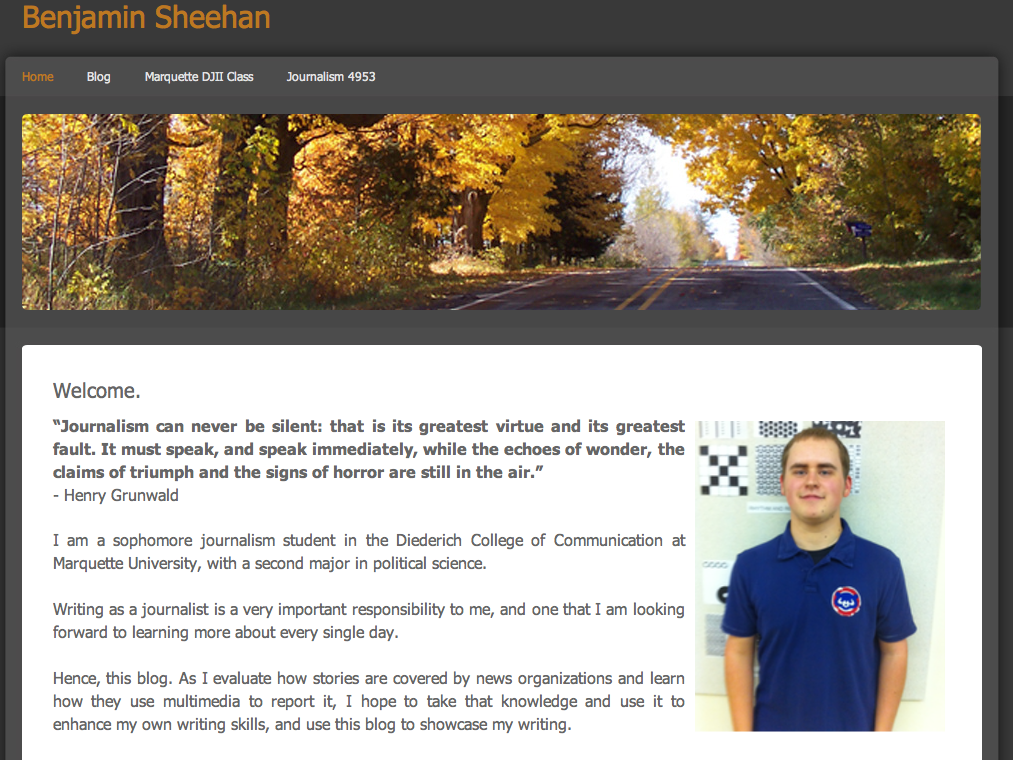
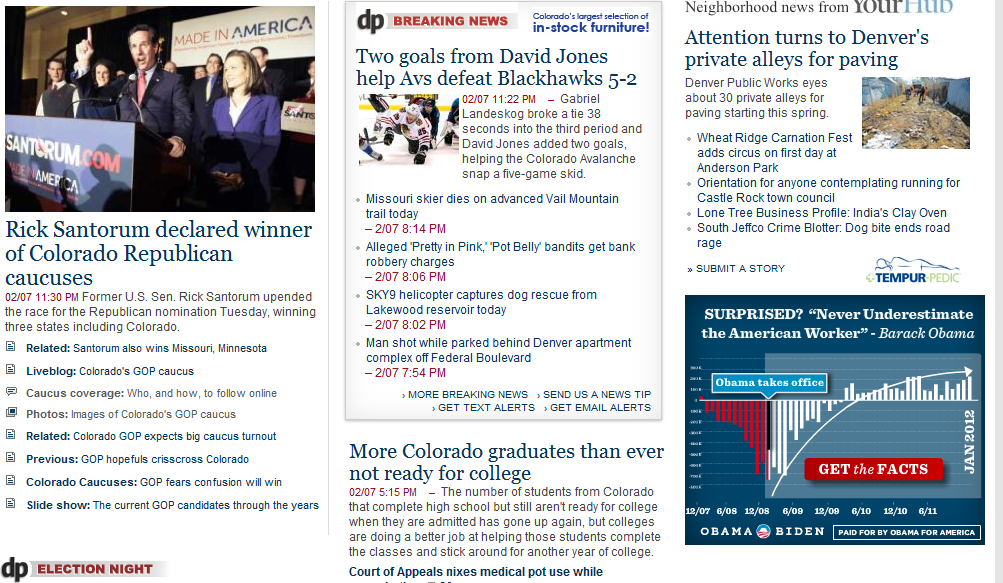

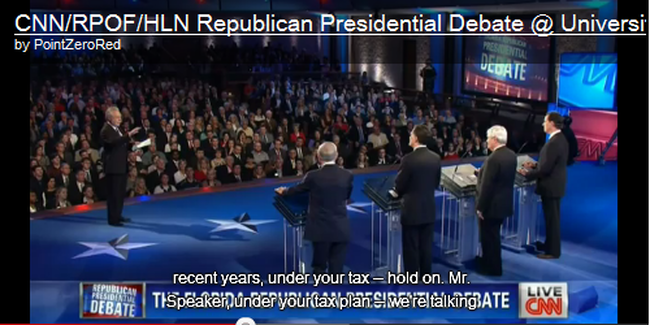
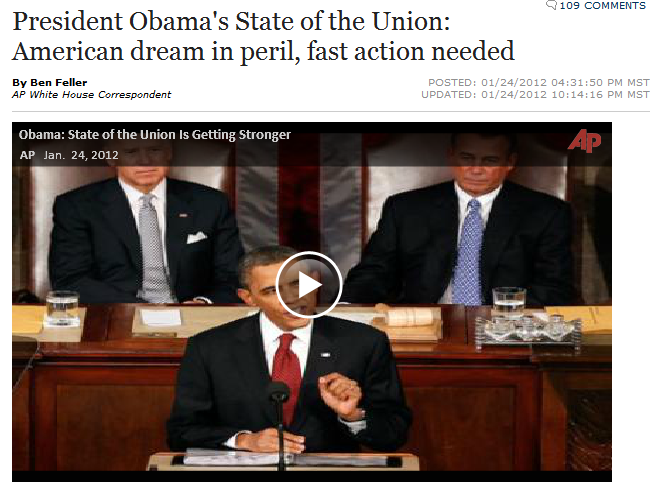

 RSS Feed
RSS Feed